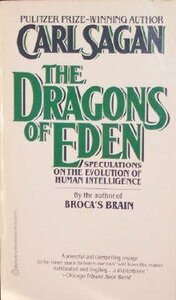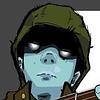Take a photo of a barcode or cover
informative
inspiring
reflective
medium-paced
This is a very good book, especially for its time. Sagan writes in a pleasant and easy to understand manner which is very accessible to lay people.
This book is about human intelligence: what it is, how it came about and how it relates to other animals, computers and extraterrestrial life. It is a rather complete book, discussing not only scientific experiments and hypotheses, but certain philosophical, sociological and environmental questions still relevant today. In fact, the scientific discussions are the most outdated things about this book. Many things he mentions about neuroscience have changed quite a lot, especially in relation to the functions of different parts of the brain. A lot of things he says about artificial intelligence and computers have changed even more drastically.
Unfortunately, I know very little about neuroscience, natural history, the evolution of humans, linguistics and other animals' intelligence and can't be sure about how outdated his information on these topics is. If anyone has any suggestions of recent books that also discuss these topics, I'd love to hear them!
I 'read' this book in audiobook format. The narration was good and very clear, but I still found it relatively hard to concentrate at moments. That is my own fault, however, as my mind tends to wander when I'm 'reading'. Audiobooks just aren't my ideal format, especially for non-fiction.
Would definitely recommend this book for anyone wanting an introduction to the topic of human intelligence, but anyone reading this book should be aware that it is outdated.
This book is about human intelligence: what it is, how it came about and how it relates to other animals, computers and extraterrestrial life. It is a rather complete book, discussing not only scientific experiments and hypotheses, but certain philosophical, sociological and environmental questions still relevant today. In fact, the scientific discussions are the most outdated things about this book. Many things he mentions about neuroscience have changed quite a lot, especially in relation to the functions of different parts of the brain. A lot of things he says about artificial intelligence and computers have changed even more drastically.
Unfortunately, I know very little about neuroscience, natural history, the evolution of humans, linguistics and other animals' intelligence and can't be sure about how outdated his information on these topics is. If anyone has any suggestions of recent books that also discuss these topics, I'd love to hear them!
I 'read' this book in audiobook format. The narration was good and very clear, but I still found it relatively hard to concentrate at moments. That is my own fault, however, as my mind tends to wander when I'm 'reading'. Audiobooks just aren't my ideal format, especially for non-fiction.
Would definitely recommend this book for anyone wanting an introduction to the topic of human intelligence, but anyone reading this book should be aware that it is outdated.
Interesting. Possibly outdated in places, but still intellectually stimulating.
Hmmmmm, I guess you can say I read this, if you count the fact that is runs from page 208, than skips to the Index at page 241. I don't think the previous owner liked those pages, but on close expection the missing pages don't look like they were ripped out, it is seamless between those two places ... it is doubly shame because it's a first edition hardcover print. :(
Outside that the book is great and I'd really love to read a modern equivalent. If anyone knows of one please direct me.
Outside that the book is great and I'd really love to read a modern equivalent. If anyone knows of one please direct me.
The details are sometimes dated, but the conclusions are still interesting and appropriate.
A beautifully written book. Even though it is outdated it reads well and Dr. Sagan shows that he anticipates the breakthroughs in technology that have since occurred. So well done, of course it won the Pulitzer prize!
emotional
hopeful
informative
inspiring
reflective
medium-paced
“We are a scientific civilization,” declared Jacob Bronowski. “That means a civilization in which knowledge and its integrity are crucial. Science is only a Latin word for knowledge… Knowledge is our destiny”.
It has the feel of an old but good NatGeo documentary. Plenty of the facts presented are by now falsified or suspect, enough for the reader to need to superimpose the material learned onto a more recent source, negating its goal as an educative object.
Instead, and in this the book excels, it is a piece of not science but of Natural Philosophy, in its literal sense. Pontifical and ponderous, giving a feeling of awe and humanity from the inhuman universe.
Instead, and in this the book excels, it is a piece of not science but of Natural Philosophy, in its literal sense. Pontifical and ponderous, giving a feeling of awe and humanity from the inhuman universe.
Too many 'Mind freaking blown' moments in this book * _ *
challenging
informative
inspiring
reflective
slow-paced
Carl Sagan is such a treasure. He writes with such clarity and passion for whatever subject he sets his sights on, which perfectly captures the wonder of the natural world. His style is informative but accessible to everyone, which is why he's one of the greatest popular science writers in my eyes. It doesn't feel like a dry textbook; it feels like going on a long walk and talking with someone who is simply passionate about a subject and wants to share it with you, with no pressure or strings attached. This subject is outside of his usual realm, which he freely admits, but his thoughts are still fascinating and thought-provoking. There is a good deal of speculation involved in this book (hence the title) but I think it's a wonderful expression of the curiosity needed for great science. Much of the information is now outdated, like the idea of the triune brain, but I won't hold that against him, seeing as it was written in the 1970s and that was the best information available at the time.





